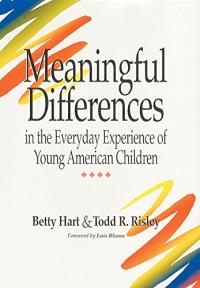
Meaningful Differences in the Everyday Experience of Young American Children
Find This Book
ISBN 1557661979
Purchase on Amazon
ISBN 1557661979
Purchase on AmazonMeaningful Differences in the Everyday Experience of Young American Children is the landmark research study that uncovered the widely cited “word gap” between children from low-income homes and their more economically advantaged peers. For 2-1/2 years, Haet and Risley recorded every word spoken at home between parent and child in 42 families, categorized as professional, working class, or welfare families. Between professional and welfare parents, there was a difference of almost 300 words spoken per hour. Extrapolating this verbal interaction to four years, a child in a professional family would accumulate experience with almost 45 million words, while an average child in a welfare family would hear just 13 million — coining the phrase “the 30 million word gap.” Hart and Risley’s follow-up studies at age 9 show that the large differences in children’s language experience were tightly linked to large differences in child outcomes. By giving children positive interactions and experiences with adults who take the time to teach vocabulary, oral language concepts, and emergent literacy concepts, children should have a better chance to succeed at school and in the workplace.